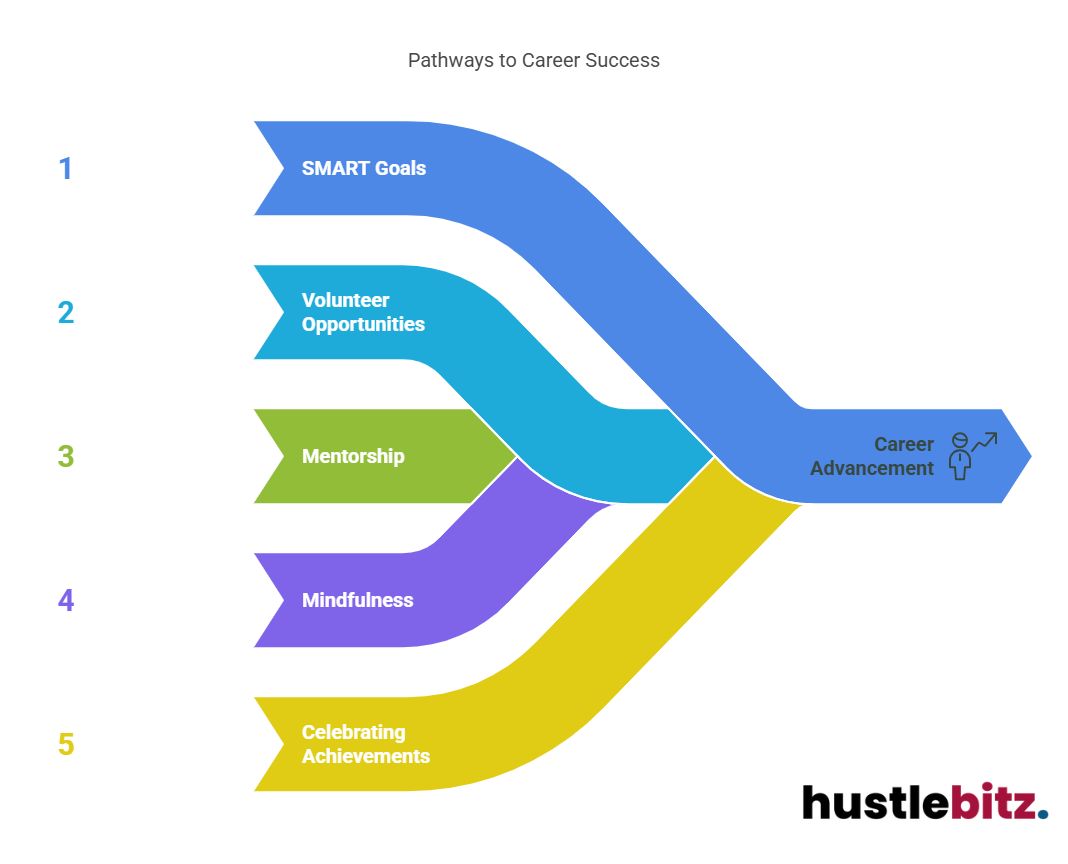To find your career motivation and stay inspired on the job, begin by identifying your core values and aligning your daily actions with them. Set clear, SMART goals that break down your aspirations into manageable steps. Engage in passion projects and explore networking opportunities to maintain excitement and connection in your field. Foster a positive work environment by promoting open communication and recognizing achievements, no matter how small. Incorporate mindfulness techniques to manage stress and enhance focus. Staying adaptable to change can also keep your career path invigorating. Discover transformative strategies to sustain your motivation and success.
Key Takeaways
- Set SMART goals to provide clarity and direction in your career, enhancing motivation and focus.
- Engage in volunteer opportunities to find inspiration and deepen your social connections within your field.
- Seek mentorship relationships for guidance, support, and fresh perspectives on your career aspirations.
- Incorporate mindfulness techniques like meditation and gratitude journaling to maintain a positive outlook and reduce stress.
- Recognize and celebrate small achievements regularly to foster motivation and reinforce a sense of progress.

Identify Your Core Values
To identify your core values, take a step back and reflect on what truly drives your passion and commitment in both your personal and professional life.
This values assessment is essential for understanding your intrinsic motivation and aligning your actions with your core beliefs. Start by listing what you consider most important, such as integrity, creativity, or community. This exercise will help in value prioritization, allowing you to clarify your personal mission and the ethical alignment necessary for fulfilling your ambitions.
As you engage in this process, be mindful of potential value conflicts that may arise. These conflicts can hinder your purpose discovery and decision-making. By acknowledging and addressing these discrepancies, you can enhance your capacity for value-driven decisions that resonate with your authentic self.
Furthermore, consider conducting an impact evaluation of your current commitments and activities. Assess how well they reflect your core values and whether they contribute to your overarching goals. This reflection will provide a clearer perspective on what changes may be needed to better align your daily actions with your values.
Ultimately, identifying and understanding your core values is a transformative journey that fosters personal growth and professional satisfaction. By anchoring your choices in your core beliefs, you not only enhance your intrinsic motivation but also pave the way for a fulfilling career that resonates with your true self.
Set Clear Career Goals

Establishing clear career goals is essential for maintaining focus and direction in your professional journey. Goal setting acts as a roadmap, guiding you through the complexities of career planning and ensuring that your efforts align with your long-term aspirations. By defining specific, measurable, achievable, relevant, and time-bound (SMART) objectives, you create a strategic vision that can enhance your professional development.
To effectively track your progress, it is crucial to implement performance metrics and milestone tracking. These tools enable you to assess your achievements and identify areas for skill enhancement. Additionally, consider utilizing a vision board to visualize your goals, as this can serve as a powerful reminder of your aspirations.
Equally important is the role of accountability partners. Collaborating with colleagues or mentors who share your commitment to career growth can provide support and motivation. They can help keep you on track and offer insights into best practices in goal setting and career planning.
Here’s a concise table summarizing key aspects of setting clear career goals:
| Aspect | Description |
| Goal Setting | Define SMART objectives for clarity. |
| Performance Metrics | Measure progress to stay accountable. |
| Milestone Tracking | Break goals into manageable steps. |
| Accountability Partners | Collaborate for support and motivation. |
Incorporating these strategies into your career planning will not only enhance your skill set but also foster a greater sense of purpose and direction in your professional life.
Find Your Passion Projects

Identifying passion projects that align with your interests and values can significantly enhance your career motivation and fulfillment.
Engaging in passion exploration allows you to integrate hobbies into your professional life, creating a more balanced and satisfying career. These side projects not only serve as creative outlets but also provide opportunities for skill development and personal growth.
To effectively find and engage in passion projects, consider the following:
- Volunteer Opportunities: Participating in community service can deepen your understanding of social issues while expanding your network.
- Networking Events: Attend gatherings that align with your personal interests, fostering connections with like-minded individuals who can inspire and motivate you.
- Mentorship Relationships: Seek out mentors who share your passions; their guidance can provide insight and enhance your professional journey.
- Artistic Expression: Explore projects that allow for artistic expression, whether through writing, visual arts, or performance, enriching your work experience.
Incorporating these passion projects into your career can lead to a more fulfilling professional journey.
By actively pursuing personal interests, you can create a space where your skills flourish and your creativity thrives.
As you embrace side projects, remember that the integration of your hobbies into your career not only enhances your motivation but also contributes to a well-rounded and inspired work life.
Ultimately, the pursuit of passion projects can lead to greater satisfaction and success in your professional endeavors.
Create a Positive Work Environment

A positive work environment fosters collaboration, creativity, and overall job satisfaction, significantly boosting employee motivation and productivity.
Essential to achieving this atmosphere is the promotion of open communication, allowing team members to express ideas and concerns freely. When employees feel heard, it enhances team collaboration and strengthens workplace positivity.
Supportive leadership plays a critical role in shaping a constructive environment. Leaders should prioritize employee recognition, acknowledging achievements both big and small, which fosters a sense of belonging and purpose. Additionally, constructive feedback is vital; it should be delivered in a manner that encourages growth and development rather than discouragement.
The physical space also contributes significantly to the work environment. Thoughtful office decor can instill a sense of comfort and creativity, while designated areas for relaxation can aid in stress management. Balancing work demands with personal life is crucial for mental wellness, and organizations must encourage work-life balance to prevent burnout.
Furthermore, implementing initiatives focused on mental wellness, such as wellness programs or regular check-ins, can help employees feel supported.
A positive environment isn’t merely about happiness; it’s about creating a foundation where individuals can thrive. By fostering a culture of collaboration, recognition, and effective communication, organizations can significantly enhance employee motivation and maintain a productive workforce.
Celebrate Small Wins

Celebrating small wins is essential for maintaining motivation and reinforcing a sense of accomplishment within the workplace. Recognizing small achievements not only boosts individual morale but also enhances team dynamics. By implementing effective recognition rituals, such as team celebrations or personal milestones, organizations can create an environment where progress is acknowledged and valued.
To effectively celebrate small wins, consider the following strategies:
- Establish Reward Systems: Create a framework that rewards small achievements, encouraging team members to strive for their goals.
- Engage in Gratitude Journaling: Encourage employees to jot down their small wins and reflect on their progress, fostering a culture of appreciation.
- Implement Progress Tracking: Utilize progress tracking tools to visualize achievements, allowing individuals to see how their contributions add up over time.
- Encourage Positive Affirmations: Promote a practice of sharing positive affirmations among team members, reinforcing a supportive atmosphere.
These practices not only highlight individual contributions but also inspire a collective sense of purpose. By celebrating small wins, organizations can cultivate an environment of motivation and engagement, leading to long-term success.
Incorporating reflective practices and goal visualization into the celebration process further strengthens this impact, ensuring that employees remain focused on their objectives. Ultimately, recognizing small achievements lays a solid foundation for sustained motivation, driving both personal and organizational growth.
Practice Mindfulness Techniques
Practicing mindfulness techniques can significantly enhance focus and reduce stress, allowing individuals to remain grounded and motivated in their careers. By incorporating mindfulness meditation into your daily routine, you create a mental space that promotes clarity and enhances decision-making. Breathing exercises can also serve as a powerful tool for instant stress reduction, enabling you to reset your mind during hectic workdays.
Gratitude journaling encourages a positive outlook, helping you recognize accomplishments and appreciate the journey. Visualization techniques can further bolster motivation by allowing you to envision your goals vividly, making them feel more attainable. Developing body awareness through practices such as yoga or mindful walking fosters a deeper connection with yourself, helping you stay present and engaged in your work environment.
Engaging your senses through sensory engagement—paying attention to sounds, sights, and smells around you—can ground you during stressful moments. Additionally, practicing focused listening enhances your communication skills, ensuring you are fully present in conversations with colleagues. Daily affirmations can reinforce your self-worth and purpose, serving as a powerful reminder of your capabilities and aspirations.
Incorporating these mindfulness techniques into your daily life not only aids in stress reduction but also cultivates a lasting sense of motivation. By prioritizing mindfulness, you can navigate workplace challenges with resilience, ultimately enhancing your overall career satisfaction and drive.
Stay Adaptable to Change

Staying adaptable to change is crucial for maintaining motivation and achieving long-term career success in today’s dynamic work environment.
Embracing uncertainty and cultivating an adaptive mindset allows professionals to navigate challenges with resilience and confidence. It is essential to develop career flexibility, as industries evolve rapidly, requiring a proactive approach to change management.
To enhance your adaptability, consider the following strategies:
- Skill Diversification: Broaden your expertise to stay relevant in your field. This could involve pursuing certifications or developing complementary skills.
- Resilience Training: Engage in programs that build emotional resilience. This training equips you to handle setbacks and maintain motivation during difficult times.
- Learning Agility: Stay open to new information and experiences. Cultivating a habit of continuous learning enables you to adjust quickly to changes.
- Innovative Thinking: Embrace a mindset that encourages creative problem-solving. Innovative thinking can lead to unique solutions and enhance your adaptability.
Final Thoughts
Staying inspired and motivated in your career requires a proactive approach. By identifying your core values, setting clear goals, and embracing passion projects, you can keep your career path fulfilling and aligned with your personal aspirations. Creating a positive work environment, practicing mindfulness, and celebrating small achievements can also enhance your focus and well-being. Additionally, cultivating adaptability allows you to thrive in an ever-evolving work landscape. Ultimately, these strategies provide a strong foundation for sustained career motivation, helping you stay energized, committed, and successful in your professional journey.




